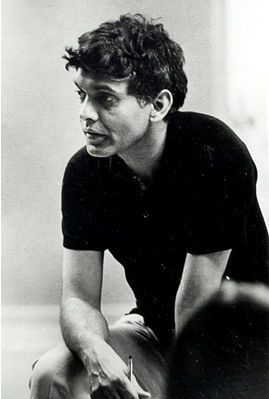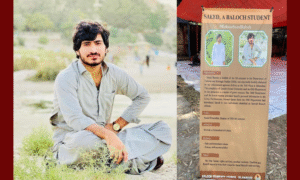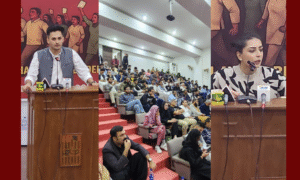Kumail Haider Jafri
Late in the night, Eqbal Ahmad made his way to the podium in a University of Massachusetts’ auditorium in 1975 to a rather tired crowd. He left the stage as an electrified crowd cheered him on to continue. Yes, it was charisma, eloquence, foresight and clarity which allowed Eqbal to be an effective orator. However, it was something more than that which attracted students around the world to him. In the speech at UMass, he pushed students to demand the university administration to offer more relevant courses – courses which the students wanted to attend, not those which the university wanted to teach, courses which addressed the dilemmas faced by them, not those which glossed over their realities. For students, Eqbal was audacity. Eqbal was hope. Eqbal was what they sought in themselves – an unapologetic, fearless voice which demanded what it deserved.
It has been exactly 21 years since he left us, however, students all around the world still face the same issues he was talking about. From fee hikes, to ethnic, religious and gendered discrimination on campuses, students are once again being asked to fend for themselves. Most administrations have decided that instead of listening to their students, they need to ‘manage’ them. Negotiations often turn into students settling for the bare minimum. Their reactions are often deemed impulsive and they are constantly infantilized. All of this is often an attempt to make students believe that they do not have any legitimacy to demand equity.
Someone like Eqbal, however, gave us perspective and reminded us that our legitimacy is not something to be achieved but something that is inherent to us. The first way he did this is by being at the forefront of causes even when sometimes he was alone. Wanting to fight in Kashmir at the age of 15, standing alongside the FLN to rid Algiers from French rule and spending all his life advocating for Palestinian freedom in a pro-Israel academia, Eqbal showed us that sometimes we are the first brick to the house we are finding. His is a lesson of identifying legitimacy in one’s own self and standing by it regardless of the doubts the rest of the world attempts to instil in us. This is essential for all students who are fighting on two fronts – with their administrations and with their insecurities and doubts.
Another way Eqbal reminds us of this inherent legitimacy is by showing us the importance of finding a community and in case we can’t find one, to build one. All those who knew Eqbal also remember his hospitality. I was talking to a journalist a few days back who had remained in touch with Eqbal consistently from 1997 to his death in 1999. He said that whenever he used to visit Eqbal, the latter made sure that he cooked food himself and served it to his guests. This was not the first time I had heard this. From Stuart Schaar to Edward Said all have written how Eqbal’s place was a convergence of different types of people coalescing to form a community. Such a community does not only provide a space for undeterred self-expression, it is also its construction which makes one understand how they possess the ability to bring people together. It is this ability to create a community which makes one realize that there is no external permission one needs to believe in something and to gather people who share that belief. Hence, when we students organize, while we keep in mind our collective aim, we also need to allow ourselves to experience this creative impulse which imbues confidence and provides us our own legitimacy which Eqbal embodied.
Lastly, it is through his voice that he makes us realize our own worth. By voice, I do not mean his ideological stance. I mean his literal voice. He stood and addressed protestors, college students, and Palestinians, but also addressed those who stood opposed to him. Edward Said narrates a story where Eqbal convinced him to accept an invitation to speak at an Israeli university. He reminded Said that those were the people most in need of his message. By standing in front of all sorts of crowds and voicing what he believed in as it is, Eqbal made his voice heard. In the midst of all the voices in the world, he showed us how sometimes we need to hear ours and makes ours heard. This does not mean that we need to impose our voice or be louder than others but merely realize that ours is also essential if one is to engage with the issue. Or as Audre Lorde puts it: “Your silence will not protect you.” If students are to truly engage with concerns facing them and to demand of their administrations a more just system, then we also ought to remind ourselves that it is in our voices that our legitimacy resides.
Hence, if we are to remember Eqbal, then we ought to remember him in his message that we are worthy of our demands, our thoughts, our beliefs, and our voices. 21 years have passed and even if 21 more pass, Eqbal shall remain alive for those who have paid heed to him and more importantly, for those who have paid heed to themselves.
The Students’ Herald News Desk focuses on reporting the latest news regarding student politics and campus updates to you.
The News Desk can be reached at admin@thestudentsherald.com




